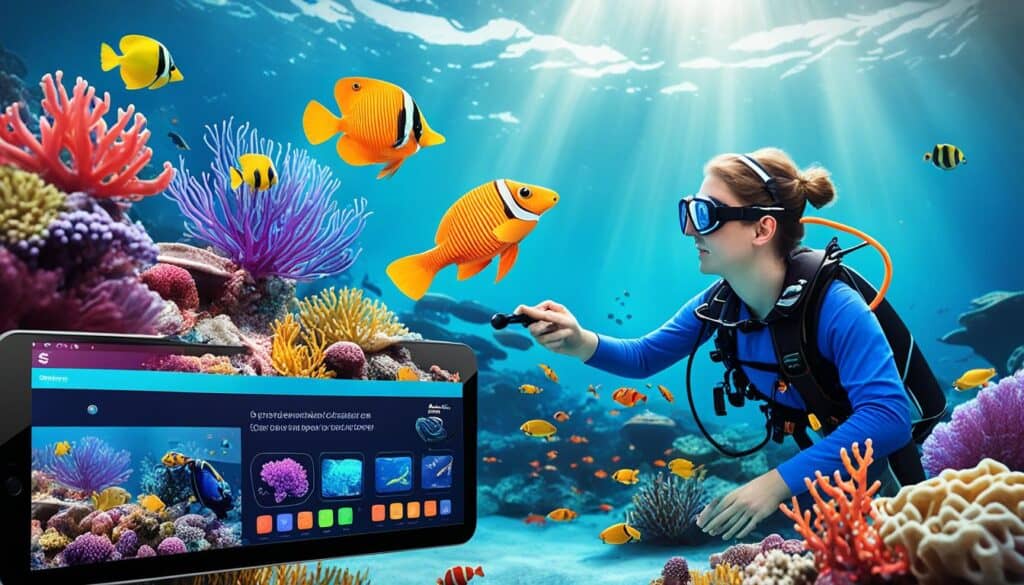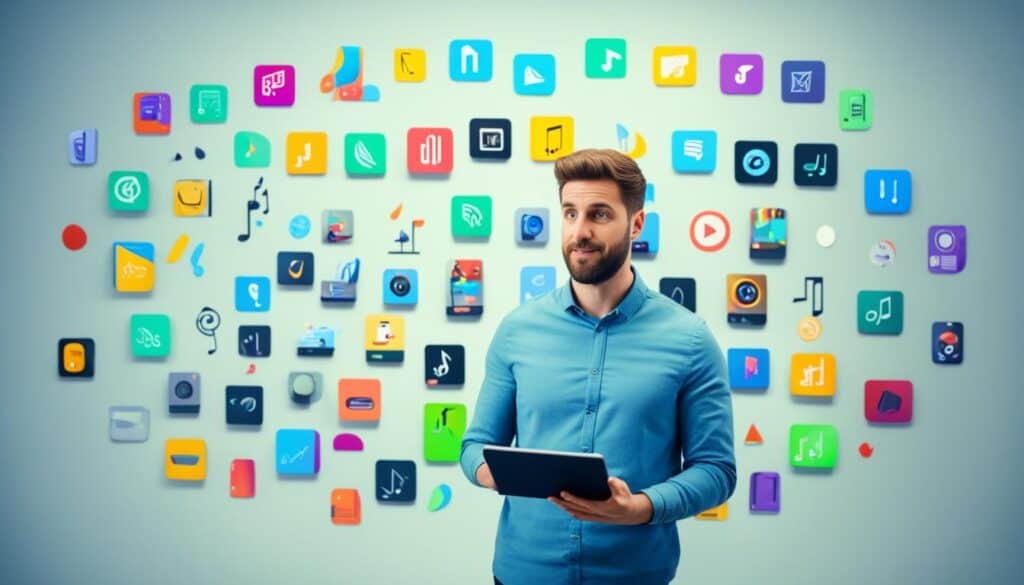Could your tween find a new favorite app that boosts their digital learning? We’re exploring the huge world of educational apps for tweens. We aim to find those special apps that make learning as fun as the newest dance move. Yes, it’s possible! It’s all about choosing learning apps that appeal to them. And at the same time, these apps should help them learn a lot.
Key Takeaways
- Identifying educational apps for tweens that mix fun with learning to catch and teach them.
- Stressing how key it is to pick apps that meet tweens’ unique needs and likes in today’s digital world.
- Noting the big role apps play in learning for tweens and the need for tech that fits all ways of learning.
- The role of interactive tech in helping tweens learn on their own and take charge of their education.
- Pointing out how education and tech work together to help grow skills in various subjects.
- Showing how important it is for parents to take part and check on their tween’s use of digital learning tools.
Finding the Balance: Educational Apps for Diverse Interests and Skills
In the world of tutoring for tweens, I’m always searching for the best in educational technology. It’s tough to find an app that excites them and is also educational. It’s like convincing them that veggies are as tasty as candy. are being made to keep tweens interested. They do so without upsetting their emotional balance.
Swiping through the App Store shows over 80,000 education- or learning-based apps. But, a large portion, 72%, is for the toddler/preschool group. What about those kids who are past simple puzzles but not ready for complex high school topics?
- Active Involvement: Tweens are full of energy. So, apps should get them to do more than just touch screens. These apps use psychology and science to make learning hands-on.
- Engagement: Excitement is key. Some apps combine fun with learning so well, they turn lessons into games. Like making music theory fun with a digital piano.
- Meaningfulness: It’s about connecting, not just memorizing. When lessons match their interests, kids dive deeper. They learn better, whether it’s poetry or exploring virtual worlds.
- Social Interaction: Apps that let kids interact and compete healthily are great. They make screen time a chance for kids to be social too.
Choosing between free and paid apps is tricky. But, paid apps generally offer more engagement. Yet, 98% of kids use mobile devices, including 96% in lower-income homes. This means there’s a big chance to introduce them to quality learning apps.
Our tweens are on screens for over two hours a day. These apps are not just digital fills. They’re key to learning. The aim? To mix fun with learning smoothly. They’re not just hitting high scores. They’re also boosting their thinking, talking, and creativity skills. This is the heart of tutoring for tweens with educational technology. And I’m all in for finding that balance.
Interactive Learning: Dive into Marine Biology and Geography Apps
Did you see a tween explore with geographical educational apps? It’s like they’re solving a puzzle—focused and determined. My living room became a mission hub. My daughter explored the deep sea on her tablet, thanks to amazing marine biology learning apps.
Seeing a kid’s face light up is something else. They get so excited over free apps like “Creatures of Light: Nature’s Bioluminescence”. Why buy candy when glowing sea creatures fill your mind?
- “Meet the Insects: Forest Edition” app made us trek through virtual woods for $3.99. It’s a bargain for such knowledge.
- The “Nature Tap” app has free bird and insect modules. More options cost $1.99 or $2.99. And I tapped a lot.
- With “Tick Bait’s Universe,” we dived into the world of creepy crawlies. It’s free at first, but the full journey costs $4.99.
It’s not just regular app stores offering these. NOAA and National Marine Sanctuaries are big players too! They have tons of resources, like The Bridge for ocean sciences. I learned a lot just browsing. And those free 360° dives in Monterey Bay? Totally immersive!
- The Watershed Activity Guide—think 7.6M PDF of environmental hero training, customizable to your local sanctuary
- It also offers a Marine Debris Monitoring Toolkit. This 3.4M PDF helps kids become mini eco-warriors and scientists!
And the best part: actual classes! They’re designed for all ages, teaching about glaciers, whales, and more. These classes are free and offer 45 minutes of worthwhile screen time. Sign-up is like Black Friday—open from December 1st through January and February. So, mark your calendars!
So, if you love “Weird But True” facts from National Geographic or hanging with “Ranger Rick”, there’s a world to explore. Or rather, an ocean full of marine biology and geography knowledge. And believe me, tweens are more than ready to dive into these learning apps without any hesitation.
Educational Apps for Tweens: A Gateway to Digital Education Mastery
I know I’m not alone in struggling to keep up with the latest online trends. Our tweens are digital pros in ways we can’t match. They don’t just use educational apps—they dive into them. I’ve found educational apps for tweens can be as varied as their interests. This turns mindless screen time into a learning adventure.
Look at News-O-Matic, with over 100 monthly articles on everything from space to sports. Imagine your tween engrossed in stories about space or basketball heroes. It’s learning without them even noticing! Then there’s Newsela Student, offering a buffet of topics adjusted for different reading levels. It’s simply brilliant.
For young language lovers or music maestros, there’s no shortage of apps. Duolingo offers lessons in 40 languages, plus music and math. It turns learning into fun. Apps like MathPapa and Photomath make algebra understandable in simple steps. These tools change frustration into achievement.
Tech savvy kids have Tynker, teaching coding through game and drone programming. More than 200 beginner tutorials are available. Meanwhile, BrainPOP turns history and science into Pixar-like movies. It captivates even those who usually show little interest in learning.
Apps like IXL, Quizlet, and Khan Academy let tweens lead their learning journey. They explore over 8,000 skills with help from fun characters. It’s like sneaking healthy food into their favorite meals. They learn happily without realizing it.
These educational apps make learning accessible with just a tap. AI tools and platforms like Brainly and Socratic promote collaborative learning. Tweens are confronting today’s challenges head-on. Now, we just need an app to spark the same enthusiasm for chores.
The Symphony of Learning: Choosing Music and Art Educational Technology
Step into the virtuoso’s shoes, my friends. It’s time to boost our tweens’ smarts with guitar strums and digital painting. Music doesn’t just please the ears; it strengthens the brain. It enhances thinking skills, memory, and helps manage anxiety. Improved executive function, sharper working memory, and melodic mastery over those pesky fluttering feelings of anxiety. For the visual arts, art apps turn our tech-savvy kids into modern Da Vincis, one tap at a time.
Let’s explore a playlist of options. There are 12 top-notch music education apps to check out. The Musical Me app teaches young kids, 3-7, the basics affordably. For tuning the ear, the Kids Ear Training app offers a full program on a budget. And the Theory Lessons app delivers fun animated lessons for less than a fancy coffee.
Piano Dust Buster is free and mixes pianos with games. Yet, it has optional costs like subscriptions. Rocksmith turns guitar strumming into a learning journey. K12’s suite helps kids from preschool to eighth grade discover their musical talents online.
Let’s talk about the unsung heroes in music education. Bob Jones University’s experts have 30 years of experience. They turn kids into musical stars and schools into stages. They offer bands, orchestras, and choirs that lead to amazing performances.
Our tweens are close to joining the University Educators Association. It gives them practical experience that complements their studies. Bob Jones University grads land music roles worldwide. Music educational technology leads the way in teaching success, one note at a time.
Navigating Screen Time: How to Pick Learning Apps That Excel
Screen time for tweens isn’t as bad as some think. Being too close to the TV won’t harm us. Today, I’m exploring how quality learning apps make screen time valuable.
Education.com is a gem with 36,000 educational materials. It is loved in 20 countries by 44 million users. This is because it goes beyond simple flashcard apps.
Gaming is something tweens are born to do. Games like Legend of Zelda or Bakugan: Defenders of the Core offer hidden lessons. Studies say kids enjoy teaching others through games. Minecraft, for example, is praised for boosting creativity.
Screen time isn’t all bad. It can make tweens more active and social. Games teach leadership and turn-taking skills. They also help kids bond.
During the 2020 lockdown, screens became our whole world. We wondered if too much screen time was harmful. But research shows concerns are often exaggerated.
Experts suggest moderation over banning screens. Screen time has benefits. It helps create meaningful educational apps for kids.
To conclude, screen time is not our enemy. It’s a chance to guide kids to amazing digital experiences. By choosing good apps, we turn screen time into a positive.
Conclusion
So here’s the scoop: educational apps for tweens can captivate and educate them, without too much screen time. I’ve seen how these apps combine fun with learning. They’re not just flashy; they teach real skills. Kids are not just playing; they’re solving complex problems that amaze me.
Let’s talk tools. These educational technologies make learning fun, so fun that kids don’t know they’re learning. The difference between great educational apps and digital junk is big. It’s important. Nearly every child has access to mobile devices. Many without much money also have access. We must make these hours count by choosing high-quality educational apps that don’t break the bank.
Educational apps aren’t just to keep kids busy. They light up curiosity and turn it into a passion for learning. We’re in a renaissance of learning. Textbooks are turning into interactive experiences. With the right apps, my kids are learning a lot. They’re facing logic puzzles and challenges. When I see them focused on the screen, I’m happy. They’re getting smarter in a fun way. That’s app-solutely fantastic, indeed.



